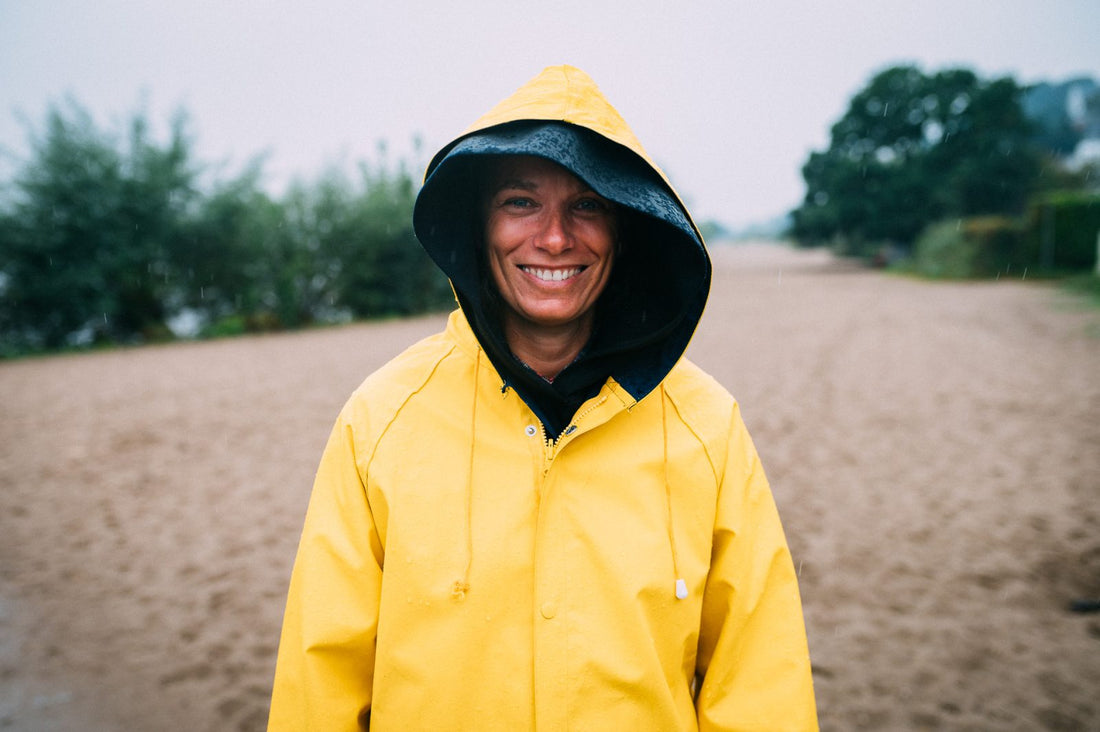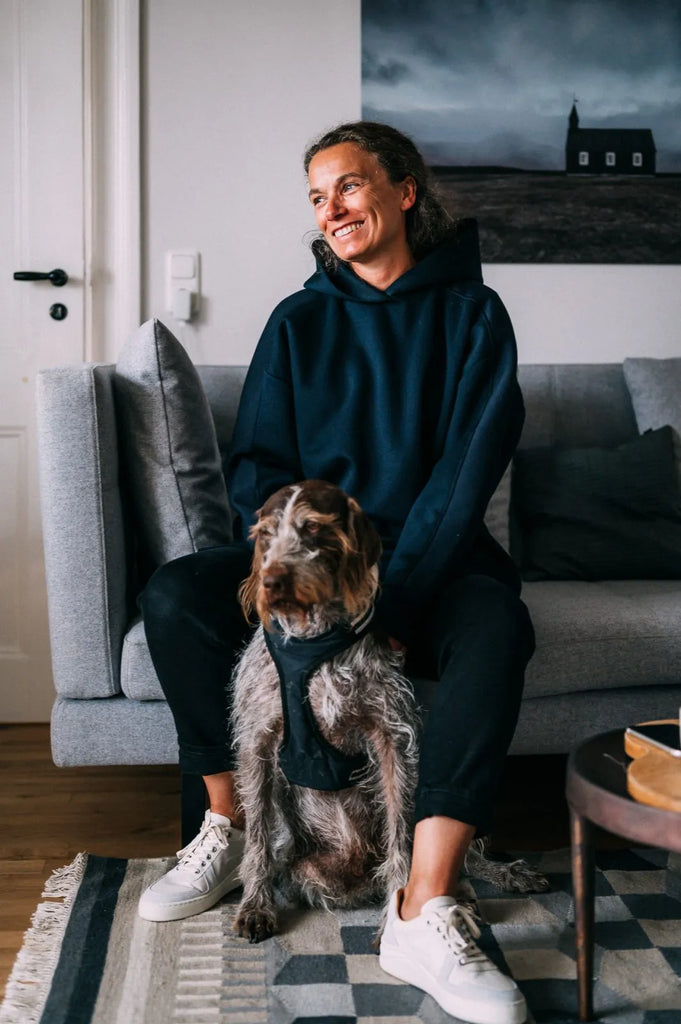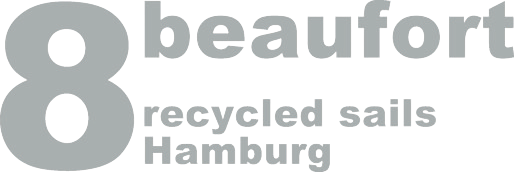
Upwind
Split
8beaufort.Hamburg shows a clear stance when it comes to sustainability. Because there is an urgent need for change in the fashion industry. And because founder Sabine Moormann knows that she has nothing to lose
Text: Laslo Seyda, photo: Niklas Marc Heinecke

She likes it when the wind blows around her ears; when rain speckles hands and face; when the cold creeps up the sleeves and trouser legs and tickles so wonderfully
Sabine Moormann has made herself comfortable on the gray sofa in the living room, in her favorite corner, snuggled up in an oversized hoodie. Your apartment is not particularly big, but very comfortable. Everything here is furnished in a Nordic style, reduced, tasteful, lots of wood, lots of white. There is another bedroom, a dining room and a small tiled kitchen with old cupboards. Through the small lattice window and from the balcony there is a wide view over hills with fishermen's houses and thick villas that are crowded together. Further down the river spills onto the beach with thick brown sand.
Even though Moormann originally comes from North Rhine-Westphalia, she has felt at home here, in the north, since she was a child. Her parents Wilhelm and Christel work as youth workers in their free time and take their daughter to holiday camp in Amrum every summer. There she and the other children collect shells all day long, go out on the shrimp boat to the North Sea or visit the bird booth, where geese, ducks, deer and wild rabbits live. Being in nature, exploring it, learning to respect it: this is natural for little Sabine.

At home, in Herzogenrath in Westphalia, people live very consciously, frugally and conserving resources. The parents belong to the war generation. They don't waste food; fix what is broken; recycle what can be recycled. “We can’t afford to throw things away,” it’s often said. When the father gives the mother new blouses or skirts for Christmas, it is always something special, the highlight for the whole next year. There is a great appreciation for everyday things in the family. And anything that is too expensive, baptismal vestments or wedding dresses for example, is simply sewn in-house. Grandma Frieda is a trained seamstress, she already does that. It is also Frieda who teaches her granddaughter Sabine her first stitches on the old Singer machine, which still runs on foot pedals. As a teenager, Moormann sewed her own pants and carnival costumes. “I've always had a great connection to practical work, I just want to do it!” The origin of her entrepreneurship. From then on, every job is a further step towards becoming a founder.
In the mid-nineties, while she was studying to be a teacher in Aachen, Moormann worked for a small mobile phone provider. Together with a few fellow students, she hires employees, opens shops, establishes processes and structures, and develops her own advertising campaigns. When the company expands, she is sent to Frankfurt as a marketing manager. Three years later, in 2001, Sabine Moormann moved to Cologne, this time into the fashion industry. For a number of large brands and producers, she takes on the purchasing of materials, product management, sales, advice and the full program. And Moormann is successful. Because she is motivated, flexible, inventive and resilient. “Plus, I get bored easily. I always need something on hand, always new challenges.”
But with every new job and every new task, the headwind becomes stronger. “The bigger the fashion company was, the less I was able to make a difference or change anything. “That frustrated me a lot,” she says, adjusting a cushion on the sofa as if she were trying to regain control after the fact. “I was also horrified at how many items of clothing ended up in the trash.” It is estimated that around 230 million textiles are destroyed every year because they were not sold. “Awesome, right?” says Sabine Moormann. At some point her vision takes concrete form: building her own company, but a sustainable one.

Being in nature, exploring it, learning to respect it: for Sabine Moormann this is natural
Then comes the hurricane that turns everything upside down.
Moormann says that she always wanted to have a family of her own; that she and her partner bought and renovated a small farm near Aachen; that everyone wants to leave something behind. But the couple's dream remains unfulfilled, despite a long wait. When asked what that did to her, Sabine Moormann looks out the window into the fog. It started to rain. Moormann smiles, a little depressed. Her eyes no longer shine as brightly as before. “Well, you can wish for a lot in life.” Then she quotes the writer Gorch Fock, who became famous with his descriptions of danger and pain and death at sea. “Given are the waves and the wind, but the sails and the rudder to win the harbor are yours.”
Sabine Moormann understands: she decides her own fate. At the age of 40, from now on, she started all over again, pulled over the wheel and moved to Hamburg. For now, she's in a long-distance relationship, taking in a puppy from the animal shelter who looks a bit like a watered-down poodle. In 2016 she enrolled in a distance learning course in environmental sciences, sustainability management and fashion. At the same time, she founded fashion-evolution GmbH, with which she wants to develop and advise sustainable brands. The 8beaufort.Hamburg brand also emerged from this company in 2018. On the Beaufort scale, which sailors use as a guide, the number 8 means that all signs point to a storm. The slogan “Sail your course” will soon adorn the brand, loosely translated: set your own course.

The idea of producing sneakers from old sails is obvious. Nobody else does that. In addition, Sabine Moormann was responsible for the shoes department at her previous employers for years and built up a huge amount of expertise. And, having been sailing since she was a teenager, she knows that the laminate sails that hang from most boat masts are a major environmental problem. Because the cloths are considered hazardous waste that is usually incinerated. Sabine Moormann believes that something beautiful can still be made out of the sails. “Above all, I wanted to prove that this idea can become big and profitable.” For her, upcycling, the reuse and upgrading of used materials, is more than just a hobby or just crafting. It's a business model. A business model that matches their values: “I want to leave the world better than I found it.”
Together with a designer, she analyzes sneaker trends, draws patterns, and selects colors and materials. Moormann's advantage: She already has many contacts with the trade, knows the production processes, and even knows some companies in Portugal that produce relatively cheaply but at the same time responsibly and deliver reliably. The founder makes the first samples herself - with an old sail that she takes in from her wooden boat Nanuk, which is anchored in the Wedel marina.
While she is building her business, Moormann scours the classified ads in newspapers and online portals for her most important material. On the weekends she visits sailors throughout northern Germany. They pull out little treasures from dusty attics and the furthest corners of boathouses. Moormann now receives most of its towels through its national and international network. “It’s hard to believe how many sails are just rotting away.”

»The perfect product simply doesn't exist yet; one that is high quality and durable, comfortable and free of harmful substances, fairly produced and completely sustainable and also affordable. But I'm doing everything I can to create this product.«
Things are a little more complicated with the other materials. Some shoes from 8beaufort.Hamburg have soles made of natural rubber. Although this raw material is biodegradable, rubber trees often grow in plantations for which tropical forests have been cleared. In other models the insoles are made of leather. That's why Sabine Moormann relies on transparency and an open dialogue with her customers in her communication. So far she has been able to take the wind out of the sails of any criticism. “The perfect product simply doesn’t exist yet; “One that is high quality and durable, comfortable and free of harmful substances, fairly produced and completely sustainable and also affordable,” says Moormann. “But I’m doing everything I can to create this product.”
Until then, Moormann will run her company as ecologically as possible. She has specifically hired a quality manager who regularly keeps an eye on production in Porto. This saves you and the environment unnecessary business trips. She only flies down once a year to release the new collection. She compensates for the return flight – as well as the CO₂ emissions caused by shipping her products. And the padding in the recycled shipping boxes is not made of plastic, but rather shredded cardboard, which does not harm the environment. The entire supply chain is well thought out: from the materials and production, to transport and the lifespan of the respective products.
The entrepreneur has plenty of ideas for new products: “Let’s see what else we can find in the ports.”
And the brand with the distinctive eight in the logo seems to be really well received: Sabine Moormann had a few hundred pairs of sneakers made for her first collection in 2019, but there are now tens of thousands. Customers seem to like the concept and demand is high. There are now also high-tops and vegan models in the range, as well as shoes and bags made from old canvas in all sizes and shapes. And the first collection for autumn and winter will come in 2022. The entrepreneur has plenty of ideas for new products: “Let’s see what else we can find in the ports.”
Even though sustainability is still considered a market niche for many, there is no fear of failure or panic about bankruptcy, says Sabine Moormann. “There are worse things than driving a company into the wall. I know this from my own experience.”
Then she gets up from the sofa. Carlos has to go outside the door again. There are now thick drops of rain there, it's whistling around the corner of the house. Sabine Moormann puts on her bright yellow Frisian mink, pulls her hood a little lower over her face, smiles again and then steps out the door and into Schietwedder.
Defying the odds, not shying away from taking risks, there is an expression for this in sailing language: hard on the wind.


3 comments
Absolutely fantastic (brand)story! I will go looking for my old sails immediately🤗
Tolles nachhaltiges Konzept,super Idee ,sehr schicke und bequeme Schuhe und eine bemerkenswerte Gründerin 🥰
Hallo, ich habe heute den Stand von 8beaufort.Hamburg auf der Modenschau in Krefeld kennengelernt und bin begeistert von der Nachhaltigkeit sowie den wirklich geschmackvollen Sneakers. Tolle Idee mit gelungener Umsetzung, die auch bezahlbar ist. Ich bin begeistert.
LG Christina Pierkes